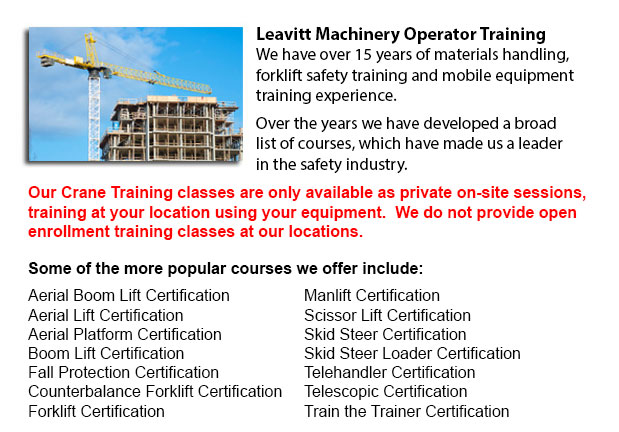
Crane License Richmond Hill - Crane operators must be "credentialed", which means they should possess a crane operator license or certification. Credentialing is considered a mandatory governmental requirement in order to practice as an operator of a crane. Having a license consists of training and final test and assessment.
To operate whatever kind of heavy machinery like cranes, the operator needs safety training. Crane operator license training combines the on-the-job supervised work and specialized training programs. These training programs are offered by industry training and certification groups. The content of training programs for crane operators could vary depending on the laws and requirements of the local industry.
The certification and training can be provided for by various kinds of cranes: mobile cranes, overhead cranes, articulator cranes and tower cranes. The overhead crane is utilized rather often in the manufacturing trade. Mobile cranes bring heavy machinery to sites where the job should be done. Articulator cranes are made use of in order to load materials and machinery onto truck beds and other heavy machinery. The biggest kind of crane is the Tower cranes, typically found in huge sea ports.
Within the manufacturing business, a supervisor of the crane department normally has the authority to offer fundamental hands-on training in the safe operation of crane machinery. After the practical part, the trainee may need to pass a course. Upon successfully completing the course, the individual training will be certified or licensed.
Various industrial environments can offer simulated crane operator training, which enables the operator to gain hands-on skills without risk to other employees or equipment. The simulated environment provides a set of virtual activities utilizing a simulated crane, like for example realistic controls. By mastering crane operation during simulated training, the operator could operate real cranes on the job.
When certified and licensed, crane operators must participate in continuing education in order to regularly upgrade their knowledge and skills. Continuous crane operator training is usually suggested for technicians so they can stay abreast of updates in crane technology and safety features.
-
Scissor Lift Certification Richmond Hill
Scissor Lift Certification Richmond Hill - Scissor lift platforms are utilized at work sites in order to allow tradespeople - like for example welders, masons and iron workers - to reach their work. Operating a scissor lift platform is usually second... More -
Narrow Aisle Forklift / Order Picker Training / Electric Pallet Jack / Electric Pallet Truck Training in Richmond Hill
A pallet jack is a model of equipment specialized in the transporting of pallets of many dimensions and weights. They might be utilized as an appendage for lift trucks, cranes and other types of heavy machinery or be used on their own. Pallet jacks a... More -
Heavy Equipment Operator Certification Richmond Hill
Heavy Equipment Operator Certification Richmond Hill - The heavy equipment operator is a person who manipulates the controls and drives various kinds of big machinery. Heavy machinery is most frequently used on construction sites in order to deliver... More -
Loader Training Richmond Hill
Loader Training Richmond Hill - Why You Must Finish A Loader Training Course - Individuals wanting work in businesses that use lift trucks must undergo a Loader Training program prior to becoming a certified operator of a lift truck. There are lots o... More -
Manlift Training Richmond Hill
Manlift Training Richmond Hill - Various manlift training programs consist of the review and content of manlift devices. An important part of the course is the practicum where students show their knowledge and practical ability to safely operate a ma... More -
Fall Protection Training in Richmond Hill
There are many injuries at work associated to falling and a lot of fall-related deaths reported every year. Most of these instances could have been prevented with better training, better measures in place, and by correctly equipping personnel before... More -
Wheel Loader Training Richmond Hill
Wheel Loader Training Richmond Hill - Commonly, the various kinds of heavy equipment training are classed into 2 categories of machinery: those which have rubber tires and tracked vehicles. Tracked vehicles consist of items like cranes, bulldozers an... More -
Forklift Certification Schools Richmond Hill
Forklift Certification Schools Richmond Hill - Forklift Certification is mandatory in North America. Hence, forklift training programs are important both for companies and for people seeking jobs in industries as forklift operators. Forklift training... More

Forklift Training Richmond Hill
TOLL FREE: 1-888-254-6157
Richmond Hill, Ontario
forklifttrainingrichmondhill.com
Email Us
About Us


